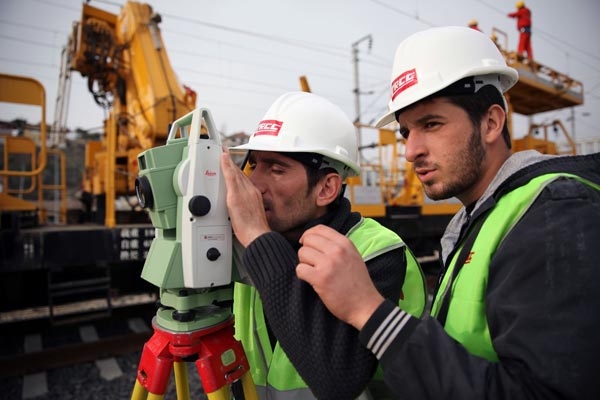 |
|
Technicians survey the AnkaraIstanbul highspeed railway, which was constructed by China Railway Construction Corp Ltd, in Turkey. China's ODI in the nonfinancial sectors totaled $74.96 billion in the first three quarters of this year. GAO BIN / XINHUA |
China's outbound direct investment is expected to grow 10 percent annually over the next five years as demand for industrial products and infrastructure surges in developed and developing markets, senior officials said on Wednesday.
Assistant Minister of Commerce Zhang Xiangchen said that China will continue to increase the flexibility of ODI procedures to allow domestic companies to assume more control of their overseas business.
China's non-financial ODI totaled $74.96 billion in the first three quarters of this year, up 21.6 percent from the same period a year earlier, fresh evidence that China's "going global" strategy is still expanding.
"International markets — especially Latin America, Africa, Southeast Asia and East Europe — still need many products such as machinery, power systems, rail and other shipping equipment, construction and household items to diversify and support their economies," Zhang told a news conference in Beijing.
"China's ODI, therefore, is essential for them to gain funds, technologies, human resources and development experience," said Zhang.
China's ODI reached a record high of $108 billion in 2013, making it the world's third-largest investor for a second consecutive year.
The government is working with other countries to enhance the status of investment protection agreements, as well as simplifying its own ODI approval procedures.
For example, as of Oct 6, the ministry scaled back its role in overseas project approvals by ending controls on the number of investment projects.
"Only projects in sensitive countries or regions, as well as in sensitive industries, will require approval by the Ministry of Commerce," said Chen Lin, commercial counselor in the ministry's department of outward investment and economic cooperation.
"Sensitive" countries or regions are those that have no diplomatic ties with China or those under United Nations sanctions. Other overseas investment projects need only be registered with the ministry.
Last year, the ministry approved 6,608 ODI projects. But this year, it will rule on only 100 cases, because it has ceded its control over the number of investment projects under the new rule.
The value of overseas assets and property owned by 25,000 Chinese companies, including 40 percent of private companies, amounts to $3 trillion in 166 countries and regions. The companies have more than 1 million employees at different locations throughout the world.
Wang Zhile, a senior researcher at the Chinese Academy of International Trade and Economic Cooperation, said the rapid growth of China's ODI will not decline in the short term, as current economic developments demand that domestic companies use resources in global markets.
"Also, a slow world economic recovery is driving many economies to seek foreign investment to boost economic growth and employment," said Wang.
China is expected to attract about $120 billion of foreign direct investment in 2014, and China's ODI may outpace FDI inflows in 2015, as Chinese companies' global competitiveness in machinery, shipbuilding and chemicals rises.
